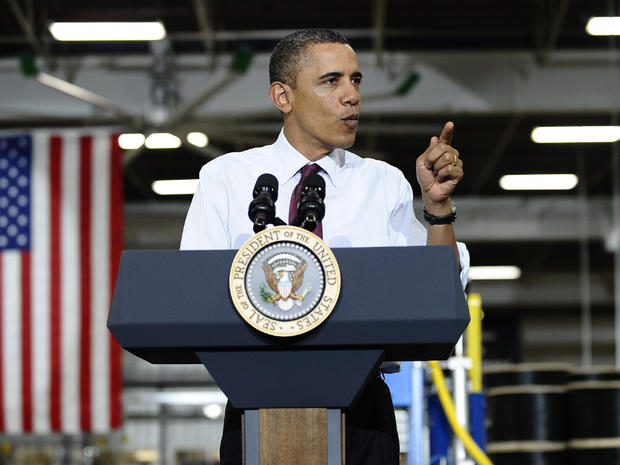Budget Day Battle: Easier to Say Cut than Do It
Monday is D-day in Washington. Deficit Day! or Debt Day, your pick. Whatever we call it, today is the day when all of the Tea Party talk comes to a head as President Obama unveils his 2012 Budget.
As usual, some details have leaked out, including the overall number of $1 trillion in savings over the next decade. That's $3 trillion less than the president's own Debt Commission hoped to achieve in its report that landed with a hollow thump on the doorsteps of many in Washington.
The White House is, however, hoping to continue investments in education, innovation, and infrastructure to keep government in the role of fostering economic development. The plan will include some new spending, some reductions in programs, and some new taxes.
Obama Proposes "Tough" $3.73T 2012 Budget
Most, if not all, new taxes are an absolute non-starter among the Republican Majority in the House and a strong minority in the Senate. But what could be seen as surprising is that some of the proposed cuts are already being fought.
One such proposal, to trim millions from a program that provides assistance to low-income Americans to pay their heating and cooling costs, is being fought by Senators of both parties from the northeast, where cold winters take their toll on the poor.
Others, including nearly $80 billion in cuts to the Pentagon's budget, are also being fought by many in the GOP, including plans to scrap a new Marine expeditionary vehicle.
The reason no one in Washington is really surprised about the opposition to those cuts is because beneath the rhetoric and the Tea Party cut-at-all-cost mantra, is the simple fact that every government program has a parent in congress, and a constituency.
Government spending doesn't happen in a vacuum, it affects real people, and real members of congress like to be able to take care of their constituents, and get credit for doing so. Conversely, while many of the most vocal critics of Washington will argue against spending, many Americans aren't heard arguing for more cops on the street, cleaner water, job training programs, or education programs like Teach for America.
Those are among the few things that House Republicans are preparing to do away with in their proposed cuts to the budget, which could be near their $100 billion goal of spending reductions. The battle that starts this week is the White House's vision of a watch-what-you-eat slimmer budget and the Republicans vision of a post-radical-weight loss surgery one.
The spending battle also comes in the middle of a larger political battle over the still fragile economy. So it's safe to say that the White House is certainly going to go to great lengths to not cut too much too soon. In fact, the White House will boast that the new budget prepares the country for long-term growth, which will make budget cutting easier down the road. As the president often says, one of the best ways to reduce the deficit is to grow the economy, and he's very aware that cutting the deficit too soon will certainly hamper that growth, as well as his re-election chances.
Because of that and the calendar itself, the deficit fight comes at a key time: pitting the president against the Republicans in congress, pitting the Tea Party-backed Republicans against more traditional Washington Republicans who like to spread federal money around their districts, and the battle of the White House against potential challengers in 2012.
At this weekend's Conservative Political Action Committee, or CPAC, meeting in Washington, the who's who of potential GOP presidential nominees came to strut their stuff and vie for the title of strongest fiscal conservative of them all. One such possible contender, former Minnesota Gov. Tim Pawlenty, spoke slowly to make sure that all the Democrats in the room heard him when he said government must not, "spend more than we take in."
That mentality will certainly play to Republican voters in next year's primaries, but what many in congress are now finding, saying you are going to cut spending is a whole heck of lot easier than doing it.

